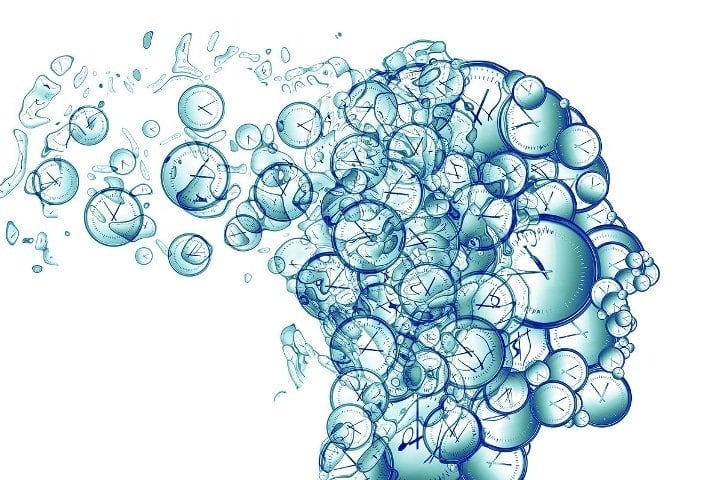Summary: Our perception of the passing of time may depend on signals that our brain receives from our bodies, specifically our heartbeats.
Source: Royal Holloway University
A recent study by academics at Royal Holloway, published in Current Biology, shows how our heartbeats can lead to distortions in our perception of time.
The study was led by Dr. Irena Arslanova and Professor Manos Tsakiris from the Department of Psychology and investigates how perception of time passing depends on the signals that our brains receive from our bodies.
People can feel time flying by when they are busy or excited about something, but at other moments, time can drag when people are bored. This suggests that our experience of time is often distorted and does not correspond to real time.
Many influential theories have looked at potential brain mechanisms to explain these distortions, but previous studies have not looked at how signals from the heart to the brain may be important in producing these distortions.
The heart and the brain are in constant communication as our heart sends signals to the brain on every single heartbeat, providing crucial information about the state of the body. The researchers used this insight to better understand how time distortions may arise.
In the new study, two experiments were conducted where researchers presented brief events either during a heartbeat (the systolic phase of the cardiac cycle), when the heart contracts and sends signals to the brain, or between heartbeats (the diastolic phase), when the heart relaxes and does not send information to the brain.
They then measured people’s time perception by asking participants to judge whether what they perceived was longer or shorter in duration as compared to a reference duration.
When events were presented at diastole, this led people to perceive time to be longer than their actual duration as if their duration had expanded. At systole, people perceived the same event to be shorter, as if it contracted in time.
Dr. Arslanova from the Department of Psychology at Royal Holloway, said, “Our findings illustrate the point that the novelist Murakami was making in his novel ‘Kafka on the Shore,’ when he wrote “time expands, then contracts, all in tune with the stirring of the heart.”

“These patterns of contraction and expansion demonstrate how our perception of time is constantly influenced by our internal physiological states.”
In the second experiment, participants did a similar task, but with images of faces with emotional expressions. Again, the same overall pattern of speeding-up at systole and slowing down at diastole was observed. But importantly, when these faces were perceived to be more emotionally intense, time overall speeded up.
The findings of this study provide a more mechanistic understanding of how common time distortions arise from phasic modulations within each heartbeat. The results may have important implications given the role that timing plays in several high-skilled tasks that humans perform (e.g., driving, playing an instrument or certain sports) and the implication of time perception in several mental health conditions, such as depression and anxiety.
Professor Manos Tsakiris from the Department of Psychology at Royal Holloway, added, “These findings highlight the intricate relationship between what goes on in our bodies and how signals from our bodies, in this case the heart, can act as a subjective pacemaker of the passage of time.”
About this time perception research news
Author: Press Office
Source: Royal Holloway University
Contact: Press Office – Royal Holloway University
Image: The image is in the public domain
Original Research: Open access.
“Perceived time expands and contracts within each heartbeat” by Irena Arslanova et al. Current Biology
Abstract
Perceived time expands and contracts within each heartbeat
Highlights
- Time-locking identical stimuli to distinct cardiac phases distorts perceived duration
- The cardiac-led time distortion is modulated by experienced arousal
- At low arousal, systolic time contraction is counteracted by diastolic time expansion
- At high arousal, diastolic time expansion shifts toward time contraction
Summary
Perception of passing time can be distorted. Emotional experiences, particularly arousal, can contract or expand experienced duration via their interactions with attentional and sensory processing mechanisms.
Current models suggest that perceived duration can be encoded from accumulation processes and from temporally evolving neural dynamics.
Yet all neural dynamics and information processing ensue at the backdrop of continuous interoceptive signals originating from within the body. Indeed, phasic fluctuations within the cardiac cycle impact neural and information processing.
Here, we show that these momentary cardiac fluctuations distort experienced time and that their effect interacts with subjectively experienced arousal. In a temporal bisection task, durations (200–400 ms) of an emotionally neutral visual shape or auditory tone (experiment 1) or of an image displaying happy or fearful facial expressions (experiment 2) were categorized as short or long.
Across both experiments, stimulus presentation was time-locked to systole, when the heart contracts and baroreceptors fire signals to the brain, and to diastole, when the heart relaxes, and baroreceptors are quiescent.
When participants judged the duration of emotionally neural stimuli (experiment 1), systole led to temporal contraction, whereas diastole led to temporal expansion. Such cardiac-led distortions were further modulated by the arousal ratings of the perceived facial expressions (experiment 2).
At low arousal, systole contracted while diastole expanded time, but as arousal increased, this cardiac-led time distortion disappeared, shifting duration perception toward contraction.
Thus, experienced time contracts and expands within each heartbeat—a balance that is disrupted under heightened arousal.







